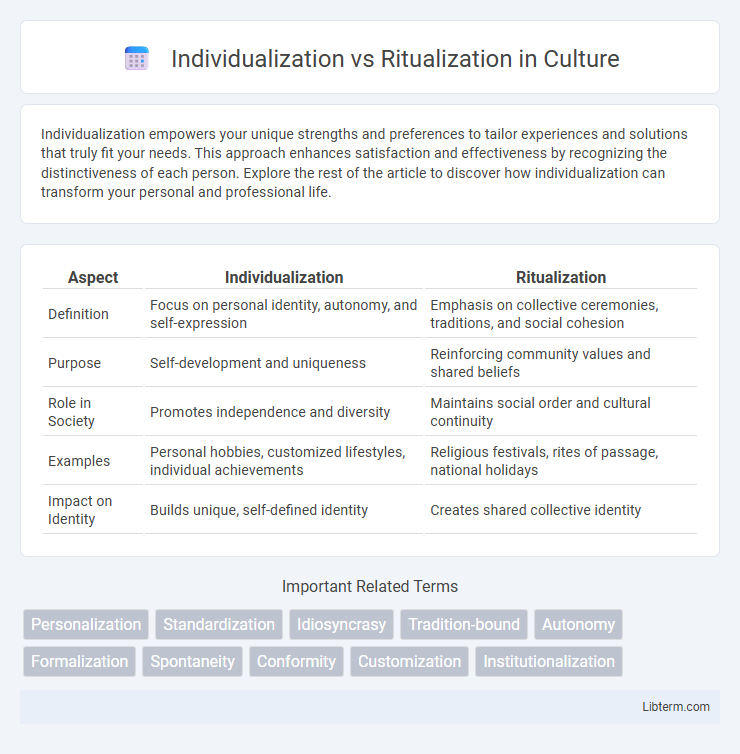Individualization empowers your unique strengths and preferences to tailor experiences and solutions that truly fit your needs. This approach enhances satisfaction and effectiveness by recognizing the distinctiveness of each person. Explore the rest of the article to discover how individualization can transform your personal and professional life.
Table of Comparison
| Aspect | Individualization | Ritualization |
|---|---|---|
| Definition | Focus on personal identity, autonomy, and self-expression | Emphasis on collective ceremonies, traditions, and social cohesion |
| Purpose | Self-development and uniqueness | Reinforcing community values and shared beliefs |
| Role in Society | Promotes independence and diversity | Maintains social order and cultural continuity |
| Examples | Personal hobbies, customized lifestyles, individual achievements | Religious festivals, rites of passage, national holidays |
| Impact on Identity | Builds unique, self-defined identity | Creates shared collective identity |
Understanding Individualization and Ritualization
Individualization refers to the process where personal preferences, identities, and choices shape behaviors and social roles distinctly, emphasizing uniqueness and self-expression. Ritualization involves standardized, repetitive actions or ceremonies that reinforce group identity, social cohesion, and shared cultural values. Understanding these concepts highlights the balance between personal autonomy and collective tradition in shaping social interactions and cultural practices.
Historical Context of Individualization vs Ritualization
Historical context reveals individualization as a rise during the Enlightenment era, emphasizing personal autonomy and self-expression against collective norms. Ritualization, deeply rooted in ancient societies, maintained social cohesion through shared customs and symbolic acts, reflecting communal identity. Industrialization and urbanization accelerated individualization by disrupting traditional rituals, reshaping social interactions in modern contexts.
Psychological Perspectives on Individualization
Psychological perspectives on individualization emphasize the development of self-identity and personal autonomy as central to mental well-being. Research highlights how individualization fosters self-expression, intrinsic motivation, and adaptive coping strategies, contrasting with the collective conformity often reinforced by ritualization. This shift influences cognitive processes related to decision-making, self-regulation, and emotional resilience, promoting a nuanced understanding of the individual's role within social contexts.
Cultural Significance of Ritualization
Ritualization holds profound cultural significance by reinforcing social cohesion and shared identity through repetitive, symbolic actions that convey collective values and beliefs. Unlike individualization, which emphasizes personal expression and autonomy, ritualization cultivates a sense of belonging and continuity within communities across generations. These practices often embody historical traditions that shape cultural norms, ensuring the transmission of meaning and social order.
Social Impacts of Individualization
Individualization fosters personal autonomy by enabling people to define their own identities and social roles, often leading to increased self-expression and innovation. However, this shift can weaken traditional social bonds and community rituals, resulting in higher feelings of isolation and decreased collective cohesion. The decline in shared rituals challenges societal integration, impacting social trust and communal support systems.
Ritualization in Modern Society
Ritualization in modern society manifests through repeated social practices that reinforce collective identity and shared values, such as national holidays, workplace ceremonies, and digital community events. These rituals provide stability and a sense of belonging amid increasing individualization, serving as anchors that connect individuals to larger social frameworks. The resurgence of virtual rituals, including online memorials and livestreamed celebrations, highlights how technology adapts traditional ritual functions to contemporary lifestyles.
Benefits and Drawbacks of Individualization
Individualization enhances personal expression and autonomy, fostering creativity and tailored decision-making that align closely with unique preferences and values. However, excessive individualization can lead to social fragmentation and reduced communal cohesion, potentially increasing feelings of isolation and weakening collective identity. Balancing personal freedom with group rituals helps maintain social bonds while supporting individual growth.
The Role of Rituals in Community Building
Rituals play a crucial role in community building by fostering a sense of belonging and shared identity through repetitive, symbolic actions that reinforce collective values. While individualization emphasizes personal expression and uniqueness, rituals create a structured environment that unites members around common traditions and goals. This dynamic strengthens social cohesion, promoting trust and cooperation within the community.
Balancing Individual Desires and Collective Practices
Balancing individual desires with collective ritualization involves integrating personal expression within shared cultural frameworks to maintain social cohesion. Ritualization provides structured practices that reinforce group identity while allowing space for individual variation to foster authenticity. Effective social systems negotiate between honoring unique personal needs and sustaining collective traditions, ensuring harmony and adaptive cultural continuity.
Future Trends: Individualization or Ritualization?
Future trends indicate a strong shift toward individualization driven by digital personalization technologies and the growing demand for unique, customized experiences. However, ritualization remains significant in fostering cultural identity and social cohesion, especially as communities seek stability amid rapid change. Balancing personalized practices with collective rituals may emerge as a crucial dynamic shaping social behavior and cultural evolution in the coming decade.
Individualization Infographic

 libterm.com
libterm.com